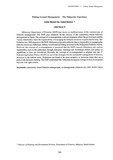Fishing Ground Management: the Malaysian Experience
Abstract
Malaysian Department of Fisheries (DOF) has lesson on ineffectiveness of the western type of fisheries management. The DOF pays attention on the success of the community-based fisheries management in Japan. The concept of co-management is placed emphasis where the government and the various stakeholders share the responsibility of managing the fisheries resources in particular locality. The Fisheries Act 1985 empowers the DOF, Malaysia as the only authority that is responsible in managing the fisheries resources, fishermen, fishing vessels and all fishing activities in the Malaysian Fisheries waters. However, the concept of co-management is practiced that the DOF consults fishermen and various stakeholders such as the politicians through dialogues, meetings and workshops, before new policy or regulations or laws are introduced. Recently, the concept of co-management is adopted into the 3rd National Agriculture Policy, (NAP3) as one of the strategies for the sustainable management of fisheries resources in the inshore areas. Fishermen are found to be more receptive to decisions when they are a party in the decision-making. The DOF established the Fishermen Economic Groups (FEGs) in localities that met with right criteria.
Citation
Shukor, A. H. bin A. (2003). Fishing ground management: the Malaysian experience. In Proceedings of the Toward Further Development of Coastal Resource Management: Lessons gained through Locally Based Coastal Resource Management in Pathew District, Chumporn Province, Thailand (pp. 205-208). Samut Prakan, Thailand: Training Department, Southeast Asian Fisheries Development Center.

